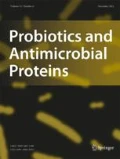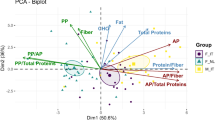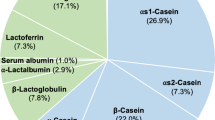Abstract
Probiotic therapies are going to be an effective alternative therapeutic strategy in the treatment and management of diabetes. The mechanism behind the essential effects of probiotic therapies in diabetic patients was not fully understood. The objective of this study was to evaluate the effects of probiotic soy milk containing Lactobacillus planetarum A7 on inflammation, lipid profile, fasting blood glucose, and serum adiponectin among patients with type 2 diabetes mellitus. Forty patients with type 2 diabetes, at the age of 35–68 years old, were assigned to two groups in this randomized, double-blind, controlled clinical trial. The patients in the intervention group consumed 200 ml/day of probiotic soy milk containing L. planetarum A7 and those in control group consumed 200 ml/day of pure soy milk for 8 weeks. Serum TNF-α, C reactive protein, adiponectin, lipid profile, and fasting blood glucose were determined before and after intervention. In intervention group, serum adiponectin in pre- and post-treatment did not show any significant changes (2.52 ± 0.74 vs 2.84 ± 0.61, P = 0.658), as well as changes in serum TNF-α and C reactive protein (172.44 ± 5.7 vs 172.83 ± 7.6, P = 0.278, 4.2 ± 1.4 vs 4.5 ± 1.9, P = 0.765, respectively). Low-density cholesterol and high-density cholesterol changed significantly (P = 0.023, P = 0.017, respectively), but fasting blood glucose did not show any significant changes. The results of this study showed that consumption of probiotic soy milk and soy milk has no effect on serum adiponectin and inflammation, but it can change lipid profile among type 2 diabetic patients.

Similar content being viewed by others
References
Stumvoll M, Goldstein BJ, van Haeften TW (2005) Type 2 diabetes: principles of pathogenesis and therapy. Lancet 365:1333–1346
Relimpio F (2003) “The relative contributions of insulin resistance and beta-cell dysfunction to the pathophysiology of Type 2 diabetes”, by Kahn SE. Diabetologia 46:1707
Bastard JP, Maachi M, Lagathu C, Kim MJ, Caron M, Vidal H et al (2006) Recent advances in the relationship between obesity, inflammation, and insulin resistance. Eur Cytokine Netw 17:4–12
Lihn AS, Pedersen SB, Richelsen B (2005) Adiponectin: action, regulation and association to insulin sensitivity. Obes Rev 6:13–21
Moller DE (2000) Potential role of TNF-alpha in the pathogenesis of insulin resistance and type 2 diabetes. Trends Endocrinol Metab 11:212–217
Borst SE (2004) The role of TNF-alpha in insulin resistance. Endocrine 23:177–182
Lin X, Zhang Z, Chen JM, Xu YY, Ye HR, Cui J et al (2015) Role of APN and TNF-alpha in type 2 diabetes mellitus complicated by nonalcoholic fatty liver disease. Genet Mol Res 14:2940–2946
Larter CZ, Farrell GC (2006) Insulin resistance, adiponectin, cytokines in NASH: which is the best target to treat? J Hepatol 44:253–261
Ouchi N, Walsh K (2007) Adiponectin as an anti-inflammatory factor. Clin Chim Acta Int J Clin Chem 380:24–30
Hui JM, Hodge A, Farrell GC, Kench JG, Kriketos A, George J (2004) Beyond insulin resistance in NASH: tNF-alpha or adiponectin? Hepatology 40:46–54
Lye HS, Kuan CY, Ewe JA, Fung WY, Liong MT (2009) The improvement of hypertension by probiotics: effects on cholesterol, diabetes, renin, and phytoestrogens. Int J Mol Sci 10:3755–3775
Panwar H, Rashmi HM, Batish VK, Grover S (2013) Probiotics as potential biotherapeutics in the management of type 2 diabetes—prospects and perspectives. Diabetes Metab Res Rev 29:103–112
Goldin BR (1998) Health benefits of probiotics. Br J Nutr 80(4):S203–S207
Boirivant M, Strober W (2007) The mechanism of action of probiotics. Curr Opin Gastroenterol 23:679–692
Sanders ME (2003) Probiotics: considerations for human health. Nutr Rev 61(3):91–99
Corthesy B, Gaskins HR, Mercenier A (2007) Cross-talk between probiotic bacteria and the host immune system. J Nutr 137:781s–790s
Isolauri E, Sutas Y, Kankaanpaa P, Arvilommi H, Salminen S (2001) Probiotics: effects on immunity. Am J Clin Nutr 73:444s–450s
Hariri M, Salehi R, Feizi A, Mirlohi M, Kamali S, Ghiasvand R (2015) The effect of probiotic soy milk and soy milk on anthropometric measures and blood pressure in patients with type II diabetes mellitus: a randomized double-blind clinical trial. ARYA Atheroscler 11:74–80
Olveira G, Gonzalez-Molero I (2016) An update on probiotics, prebiotics and symbiotics in clinical nutrition. Endocrinol Nutr. doi:10.1016/j.endonu.2016.07.006
Samah S, Ramasamy K, Lim SM, Neoh CF (2016) Probiotics for the management of type 2 diabetes mellitus: a systematic review and meta-analysis. Diabetes Res Clin Pract 118:172–182
Sadeghi-Aliabadi H, Mohammadi F, Fazeli H, Mirlohi M (2014) Effects of Lactobacillus plantarum A7 with probiotic potential on colon cancer and normal cells proliferation in comparison with a commercial strain. Iran J Basic Med Sci 17:815–819
Bahls LD, Venturini D, Scripes Nde A, Lozovoy MA, Simao TN, Simao AN et al (2011) Evaluation of the intake of a low daily amount of soybeans in oxidative stress, lipid and inflammatory profile, and insulin resistance in patients with metabolic syndrome. Arq Bras Endocrinol Metabol 55:399–405
Nordentoft I, Jeppesen PB, Hong J, Abudula R, Hermansen K (2008) Increased insulin sensitivity and changes in the expression profile of key insulin regulatory genes and beta cell transcription factors in diabetic KKAy-mice after feeding with a soy bean protein rich diet high in isoflavone content. J Agric Food Chem 56:4377–4385
Ristic Medic D, Ristic V, Arsic A, Postic M, Ristic G, Blazencic Mladenovic V et al (2006) Effects of soybean D-LeciVita product on serum lipids and fatty acid composition in type 2 diabetic patients with hyperlipidemia. Nutr Metab Cardiovasc Dis NMCD 16:395–404
Zielinska D, Kolozyn-Krajewska D, Goryl A, Motyl I (2014) Predictive modelling of Lactobacillus casei KN291 survival in fermented soy beverage. J Microbiol 52:169–178
Tsangalis D, Wilcox G, Shah NP, Stojanovska L (2005) Bioavailability of isoflavone phytoestrogens in postmenopausal women consuming soya milk fermented with probiotic bifidobacteria. Br J Nutr 93:867–877
Li C, Li X, Han H, Cui H, Peng M, Wang G et al (2016) Effect of probiotics on metabolic profiles in type 2 diabetes mellitus: a meta-analysis of randomized, controlled trials. Medicine 95:e4088
Hsieh FC, Lee CL, Chai CY, Chen WT, Lu YC, Wu CS (2013) Oral administration of Lactobacillus reuteri GMNL-263 improves insulin resistance and ameliorates hepatic steatosis in high fructose-fed rats. Nutr Metab 10:35
Tabuchi M, Ozaki M, Tamura A, Yamada N, Ishida T, Hosoda M et al (2003) Antidiabetic effect of Lactobacillus GG in streptozotocin-induced diabetic rats. Biosci Biotechnol Biochem 67:1421–1424
Lee YH, Magkos F, Mantzoros CS, Kang ES (2011) Effects of leptin and adiponectin on pancreatic beta-cell function. Metab Clin Exp 60:1664–1672
Spranger J, Kroke A, Mohlig M, Bergmann MM, Ristow M, Boeing H et al (2003) Adiponectin and protection against type 2 diabetes mellitus. Lancet 361:226–228
Kim SW, Park KY, Kim B, Kim E, Hyun CK (2013) Lactobacillus rhamnosus GG improves insulin sensitivity and reduces adiposity in high-fat diet-fed mice through enhancement of adiponectin production. Biochem Biophys Res Commun 431:258–263
Kadooka Y, Sato M, Imaizumi K, Ogawa A, Ikuyama K, Akai Y et al (2010) Regulation of abdominal adiposity by probiotics (Lactobacillus gasseri SBT2055) in adults with obese tendencies in a randomized controlled trial. Eur J Clin Nutr 64:636–643
Hatakka K, Martio J, Korpela M, Herranen M, Poussa T, Laasanen T et al (2003) Effects of probiotic therapy on the activity and activation of mild rheumatoid arthritis–a pilot study. Scand J Rheumatol 32:211–215
Alipour B, Homayouni-Rad A, Vaghef-Mehrabany E, Sharif SK, Vaghef-Mehrabany L, Asghari-Jafarabadi M et al (2014) Effects of Lactobacillus casei supplementation on disease activity and inflammatory cytokines in rheumatoid arthritis patients: a randomized double-blind clinical trial. Int J Rheum Dis 17:519–527
Tonucci LB, Olbrich Dos Santos KM, Licursi de Oliveira L, Rocha Ribeiro SM, Duarte Martino HS (2015) Clinical application of probiotics in type 2 diabetes mellitus: a randomized, double-blind, placebo-controlled study. Clin Nutr. doi:10.1016/j.clnu.2015.11.011
Nikbakht E, Khalesi S, Singh I, Williams LT, West NP, Colson N (2016) Effect of probiotics and synbiotics on blood glucose: a systematic review and meta-analysis of controlled trials. Eur J Clin Nutr. doi:10.1007/s00394-016-1300-3
Kasinska MA, Drzewoski J (2015) Effectiveness of probiotics in type 2 diabetes: a meta-analysis. Pol Arch Med Wewn 125:803–813
Acknowledgments
We are grateful to the Isfahan soy milk company that provided soy milk products for the present study, and we express our special thanks to all patients that participate in our study. Funding was provided by Isfahan University of Medical Sciences (Grant No. 393150).
Author information
Authors and Affiliations
Corresponding author
Ethics declarations
Conflict of interest
The authors declares that they have no conflict of interest.
Additional information
Reza Ghiasvand and Sadegh Feizollahzadeh are first co-author.
Rights and permissions
About this article
Cite this article
Feizollahzadeh, S., Ghiasvand, R., Rezaei, A. et al. Effect of Probiotic Soy Milk on Serum Levels of Adiponectin, Inflammatory Mediators, Lipid Profile, and Fasting Blood Glucose Among Patients with Type II Diabetes Mellitus. Probiotics & Antimicro. Prot. 9, 41–47 (2017). https://doi.org/10.1007/s12602-016-9233-y
Published:
Issue Date:
DOI: https://doi.org/10.1007/s12602-016-9233-y




